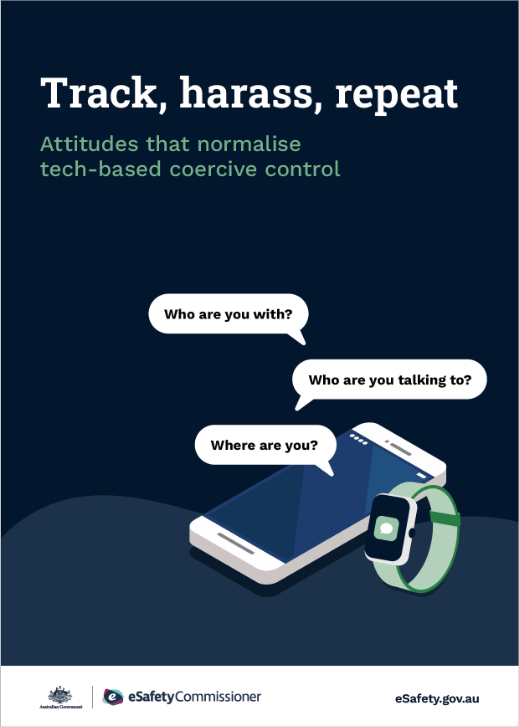Track, harass, repeat: Investigating attitudes that normalise tech-based coercive control
Coercive control is a pattern of abusive behaviour used to control someone within a relationship through manipulation, pressure and fear. It’s not one behaviour or incident, but a pattern of controlling behaviour.
This summary report explores attitudes and expectations that could normalise the use of tech-based coercive control in relationships.
People who use coercive control in a relationship are more likely to use physical violence against their partner and any children involved, and there is a greater risk of physical harm, including intimate partner homicide.
When someone uses digital technology as part of that abusive behaviour, it’s known as ‘technology-facilitated coercive control’ or ‘tech-based coercive control’. This can include behaviours such as monitoring and surveillance, cyberstalking with tracking, impersonation, hacking, harassment and abuse. It is often subtle and targeted and this can make it difficult to identify.
To inform our prevention-focussed education and training, we wanted to understand the prevalence of certain harmful expectations and attitudes relating to tech-based surveillance and micro-management (often elements of tech-based coercive control) in intimate relationships.
Summary of key findings
- Men, younger adults and linguistically diverse adults were more likely to agree with behaviours that could foster an unhealthy dependency or controlling dynamic within intimate relationships. This includes constantly messaging an intimate partner, tracking their location and controlling what they post on social media.
- Men and linguistically diverse adults were more likely to agree that insisting on checking how an intimate partner looks in a photo, wanting them to be constantly available to respond to the partner’s texts and calls, and constantly texting them were all usually a sign of care from a partner within an intimate relationship.
- Men, linguistically diverse adults and married adults were more likely to agree that, within an intimate relationship, it was reasonable for a partner to expect to have their partner’s personal passwords and to track them whenever they wanted.
Our findings highlight the need for nuanced and targeted education and communication activities to:
- increase awareness of tech-based coercive control
- reshape how people think about digital privacy and respect in digital environments when in an intimate relationship
- reinforce that consent is an active and ongoing process.
About this report
In October 2024, we commissioned quantitative research into attitudes and expectations that could normalise the use of tech-based coercive control in intimate partner relationships.
A nine-question survey was developed, building upon work undertaken for the ‘Technology-Facilitated Abuse Scale’ as part of the 2021 National Community Attitudes towards Violence Against Women Survey.
We surveyed 2,046 Australian adults 18 years or older on the extent to which they agreed or disagreed with specific online behaviours or expectations as being either caring or reasonable in an intimate relationship.
